MercoPress. South Atlantic News Agency
Venezuela
-
Thursday, May 18th 2017 - 10:36 UTC
Brazil faces humanitarian crisis in Venezuelan border as thousands spill over
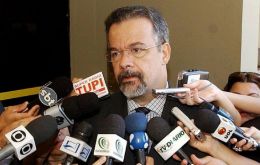
Brazil is concerned about growing numbers of refugees spilling over its border from Venezuela and is creating a plan to deal with a possible mass influx if the crisis in Venezuela worsens, Brazilian Defense Minister Raul Jungmann said on Wednesday.
-
Monday, May 15th 2017 - 20:19 UTC
Venezuelans Mothers Day appeal to the military: lay down your weapons and help remove Maduro
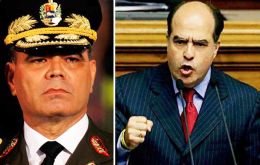
Venezuela's opposition movement on Sunday called on the military to enter dialogue with other representative of society amid a wave of near daily protests that so far have left almost fifty people killed. After pledging loyalty to Venezuelan President Nicolas Maduro last year, the armed forces have effectively enforced a violent policy to curb opposition demonstrations.
-
Friday, May 12th 2017 - 13:58 UTC
Large caches of weapons in Venezuela, “a real threat” as repression increases
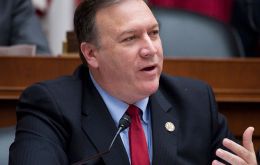
Venezuela has large caches of weapons that are at risk of falling into the wrong hands, the head of the Central Intelligence Agency told a Senate panel Thursday, adding, “It's a real threat.” CIA Director Mike Pompeo shared that assessment at a Senate intelligence committee hearing.
-
Wednesday, May 10th 2017 - 06:44 UTC
Venezuela health crisis: sharp rise in infant mortality and maternal death rates
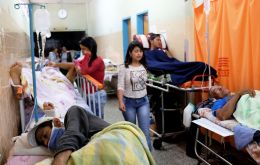
There has been a sharp rise in infant mortality and maternal death rates in Venezuela. In the first figures released for two years, the Health Ministry said the number of women dying in childbirth was up by 65%, while child deaths were up 30%. There has also been a jump in illnesses such as malaria and diphtheria.
-
Saturday, May 6th 2017 - 08:04 UTC
Venezuela death toll climbs to 40; some military refuse to repress; statue of Chavez destroyed

A 20-year-old Venezuelan protester died on Friday after being shot in the head, authorities said, taking fatalities from a month of anti-government unrest to at least 40 as the opposition geared up for more demonstrations. Hecder Lugo was hurt during fighting between demonstrators and security forces in Valencia on Thursday that also injured four others, the local opposition Mayor Enzo Scarano said in a series of tweets.
-
Thursday, May 4th 2017 - 07:12 UTC
Venezuela situation escalates in violence and hatred with no rational solution on sight
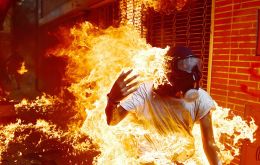
Street protests in Venezuela claimed at least two more fatalities on Wednesday, bringing the total number of people killed to more than 30 in several weeks of unrest. Thousands of Venezuelans took to the streets as president Nicolas Maduro began the process of overhauling the country's constitution -- a move that has raised the stakes in a bitter standoff between Maduro's government and a growing opposition.
-
Tuesday, May 2nd 2017 - 07:07 UTC
US Supreme Court rules in favor of Venezuela in dispute with US oil drilling company

The U.S. Supreme Court on Monday tossed out a lower court's ruling that had allowed a US oil drilling company to sue Venezuela over the seizure of 11 drilling rigs in 2010 but allowed the business another chance to press its claims.
-
Thursday, April 27th 2017 - 09:32 UTC
Venezuela quitting OAS; death toll of demonstrations climbs to 33
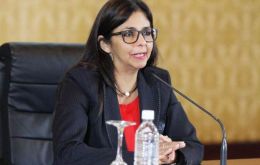
Following through on its threat, Venezuela's government announced on Wednesday it is quitting the Organization of American States, accusing the regional body of meddling in its internal affairs over weeks of political unrest. The step was taken just hours after violent clashes in Caracas between security forces and protesters during yet another march against the socialist government of President Nicolas Maduro.
-
Wednesday, April 26th 2017 - 08:20 UTC
EU/Mercosur trade agreement “closer than ever”, says Spanish president Rajoy
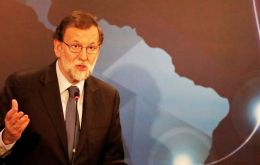
The European Union and South American trade bloc Mercosur should intensify talks to reach a trade agreement this year, Spanish Prime Minister Mariano Rajoy said on Tuesday, urging haste after 18 years of negotiations.
-
Tuesday, April 25th 2017 - 07:28 UTC
Renewed violence in Venezuela raises the death toll in three weeks to 24

Three people were killed in Venezuela on Monday in renewed violence, raising the death toll in three weeks of massive demonstrations against populist President Nicolas Maduro to 24, officials said. Several others were seriously injured and “between life and death,” said public defender Tarek William Saab.